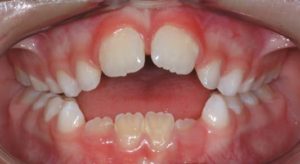Can Thumb Sucking Cause Children to Need Braces?
The short answer to this question is yes. But, as always, we have a much longer, more detailed explanation for you. If you are the parent of young children with this habit, here is what you need to know.
Non-Nutritive Sucking Behaviors

Thumb sucking joins pacifier use in a broader category of habits called “non-nutritive sucking behaviors” or NNSB. Infants and toddlers use sucking motions to get their nutrition from both breast-feeding and bottle-feeding.
Any sucking motion that does not obtain “food” is non-nutritive because it does not provide any nutrition. That does not mean that there is no purpose in non-nutritive sucking behavior. Children often use NNSBs to self-soothe in order to go to sleep or to cope with a stressful situation. This is considered perfectly normal during the first two years of life. In fact, over 90% of children show some form of NNSB up to age two.
Researchers have not agreed upon a specific age that this behavior should stop, but most feel that NNSB should naturally stop by age four. Habits that persist longer than that may require intervention. Past the age of four years, NNSB is considered abnormal.
Consequences of Thumb Sucking
When a child continues to suck his or her thumb as a constant habit during the years of early childhood, it can affect the growth of the face, jaws and teeth. The upward pressure of the thumb on the roof of the mouth combined with the added force of sucking affects the growth of the hard palate, making it high-vaulted and narrow.
Changes in Teeth Position 
The constant presence of the thumb between the upper and lower jaws can cause two harmful growth changes. One is a flaring of the upper front teeth outward. This spacing and angulation of these front teeth prevents the upper and lower teeth from coming together when the child bites down, so he will be unable to bite through food items with the front teeth. The child will have trouble in speech and could develop a permanent lisp.
When only the teeth are involved, orthodontics can quickly fix the problem. In many cases, an orthodontist is able to help the child stop the habit of thumb sucking and reposition the teeth during the initial phase of orthodontic treatment.
Changes in Jaw Development
Another consequence could be a harmful effect on the growth of the upper and lower jaws. Outwardly, this will appear as a narrow facial structure with the child being unable to close the lips together without straining. The narrowness of the jaws can lead to breathing difficulties and problems like sleep apnea and snoring.
Mouth breathing is a constant problem for children with this type of jaw structure.
In order to correct problems with jaw growth, early orthodontic intervention is necessary. If you begin orthodontic treatment while the child is still growing, the orthodontist can guide the remaining growth of the jaws into the correct configuration. Unfortunately, if you wait until the child has stopped growing to address problems with the jaw relationship, fixing it will require invasive jaw surgery.
How to Help Your Child Stop Thumb Sucking
As with every potential dental problem, prevention is always simpler and less expensive than treatment. If possible, encourage your child to stop sucking his or her thumb by age four years. Even if you have already passed the four-year mark, you should still work on stopping the habit. The sooner the better!
Due to the thumb sucking habit’s roots in self-soothing and coping mechanisms, studies show that negative reinforcement does not typically work well in this type of habit breaking. Encouragement with positive reinforcement will help your child understand that they no longer need this habit to feel safe. Reward efforts made in the direction of quitting, and continue encouraging through setbacks. If the child feels stressed or upset by the efforts to stop, that will only make him want to suck his thumb more.
Thumb sucking can be a more difficult habit to break than pacifier use because you can simply take a pacifier away. The child always has the thumb at his disposal, which makes it harder to resist. Talk to your pediatrician and dentist about tips on helping your child break the habit of thumb sucking.
More Questions about How Thumb Sucking Affects the Teeth and Jaws?
Call Designer Smiles today to schedule a consultation with Dr. Ann and Dr. Lauren. They can answer any questions you have about your child’s growth and development and refer you to an orthodontist when treatment becomes necessary.
